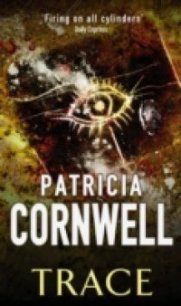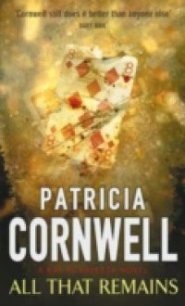Cruel and Unusual - Cornwell Patricia (книги онлайн полные версии .txt) 📗
“Why are you saying all this to me?” I asked.
“Because at this time in your life, you need to know it. You are in trouble, as I've already stated. You are simply too proud to admit it.”
I was silent, my thoughts engaged in a fierce debate.
“I will help you if you will allow it.”
If he was telling me the truth, then it was vital that I respond in kind. I glanced toward his open door and imagined how easy it would be for anyone to walk in here. I imagined how easy it would be for someone to confront him as he hobbled to his car.
“If these incriminating stories continue to be printed in the newspaper, for example, it would behoove you to develop a few strategies -”
I interrupted him. “Mr. Grueman, when was the last time you saw Ronnie Joe Waddell?”
He paused and stared up at the ceiling. “The last time I was in his physical presence would have been at least a year ago. Typically, most of our conversations were over the phone. I would have been with him in the end had he permitted it, as I've already mentioned.”
“Then you never saw him or spoke with him when he was supposedly at Spring Street awaiting execution.”
“Supposedly? That's a curious choice of words, Dr. Scarpetta.”
“We can't prove it was Waddell who was executed the night of December thirteenth.”
“Certainly you're not serious.” He looked amazed.
I explained all that had transpired, including that Jennifer Deighton was a homicide and Waddell's fingerprint had turned up on a dining room chair inside her home. I told him about Eddie Heath and Susan Story, and the evidence that someone had tampered with AFIS. When I was finished, Grueman was sitting very still, his eyes riveted on me.
“My Lord,” he muttered.
“Your letter to Jennifer Deighton never turned up,” I went on. “The police found neither that nor her original fax to you when they searched her house. Maybe someone took them. Maybe her killer burned them in her fireplace the night of her death. Or maybe she disposed of them herself because she was afraid. I do believe she was killed because of something she knew.”
“And this would be why Susan Story was killed, too? Because she knew something?”
“Certainly that's possible,” I said. “My point is that so far two people linked to Ronnie Waddell have been murdered. In terms of someone who might know a lot about Waddell, you would be considered high on the list.”
“So you think I may be next,” he said with a wry smile. “You know, perhaps my biggest grievance against the Almighty is that the difference between life and death should so often turn on timing. I consider myself forewarned, Dr. Scarpetta. But I am not foolish enough to think that if someone intends to shoot me I can successfully elude him.”
“You could at least try,” I said. “You could at least take precautions.”
“And I shall.”
“Maybe you and your wife could go on a vacation, get out of town for a while.”
“Beverly has been dead for three years,” he said.
“I'm very sorry, Mr. Grueman.”
“She had not been well for many years - in fact, not for most of the years we were together. Now that I have no one to depend on me, I have given myself up to my proclivities. I am an incurable workaholic who wants to change the world.”
“I suspect that if anyone could come close to changing it, you could.”
“That is an opinion not based on any sort of fact, but I appreciate it nonetheless. And I also want to express to you my great sadness over Mark's death. I did not know him well when he was here, but he seemed to be a decent-enough fellow.”
“Thank you.”
I got up and put on my coat. It took me a moment to find my car keys.
He got up, too. “What do we do next, Dr. Scarpetta?”
“I don't suppose you have any letters or other items from Ronnie Waddell that might be worth processing for his latent prints?”
“I have no letters, and any documents that he might have signed would have been handled by a number of people. You're welcome to try.”
“I'll let you know if we have no other alternative. But there is one final thing I've been meaning to ask.”
We paused in the doorway. Grueman was leaning on his cane. “You mentioned that during your last conversation with Waddell, he made three last requests. One was to publish his meditation, another to call Jennifer Deighton. What was the third?”
“He wanted me to invite Norring to the execution.”
“And did you?”
“Well, of course,” Grueman said. “And your fine governor didn't even have the manners to RSVP.”
10
It was late afternoon, and Richmond's skyline was in view when I called Rose.
“Dr. Scarpetta, where are you?”
My secretary sounded frantic. “Are you in your car?”
“Yes. I'm about five minutes from downtown.”
“Well, keep driving. Don't come here right now.”
“What?”
“Lieutenant Marino's trying to reach you. He said if I talk to you to tell you to call him before you do anything. He said it's very, very urgent.”
“Rose, what on earth are you talking about?”
“Have you been listening to the news? Did you read the afternoon paper?”
“I've been in D.C. all day. What news?”
“Frank Donahue was found dead early this afternoon.”
“The prison warden? That Frank Donahue?”
“Yes.”
My hands tensed on the wheel as I stared hard at the road.
“What happened?”
“He was shot. He was found in his car a couple of hours ago. It's just like Susan.”
“I'm on my way,” I said. gliding into the left lane and accelerating.
“I really wouldn't. Fielding's already started on him. Please call Marino. You need to read the evening paper. They know about the bullets.”
`They?” I said.
“Reporters. They know about the bullets linking Edgy; Heath's and Susan's cases.”
“I called Marino's pager and told him I was on my way home. When I pulled into my garage, I went straight to the front stoop and retrieved the evening paper.
A photograph of Frank Donahue smiled above they fold: The headline read, “STATE PENITENTIARY WARDEN SLAIN.”
Below this was a second story featuring the photograph of another state official - me: That story's lead was that the bullets recovered from the bodies of the Heath boy and Susan had been fired from the same gun, and a number of bizarre connections seemed to link both homicides to me. In addition to the same intimation that had run in the Post was information much more sinister. My fingerprints, I was stunned to read, had been recovered from an envelope containing cash that the police had found inside Susan Story's house. I had demonstrated an “unusual interest” in Eddie Heath’s case by appearing at Henrico Doctor's Hospital, prior to his death, to examine his wounds. Later I had performed his autopsy, and it was at this time that Susan refused to witness his case and supposedly fled from the morgue When she was murdered less than two weeks later, I responded to the scene, appeared unannounced at the home of her parents directly afterward to ask them questions, and insisted on being present during the autopsy. I was not directly assigned a motive for malevolence toward anyone, but the one implied in Susan's case was as infuriating as it was amazing. I may have been making major mistakes on the job. I had neglected to print Ronnie Joe Waddell when his body came to the morgue after his execution. I recently had left the body of a homicide victim in the middle of a corridor, virtually in front of an elevator used by numerous people who worked in the building, thus seriously compromising the chain of evidence. I was described as aloof and unpredictable, with colleagues observing that my personality had begun to change after the death of my lover, Mark James. Perhaps Susan, who had worked by my side daily, had possessed knowledge that could ruin me professionally. Perhaps I had been paying for her silence.



